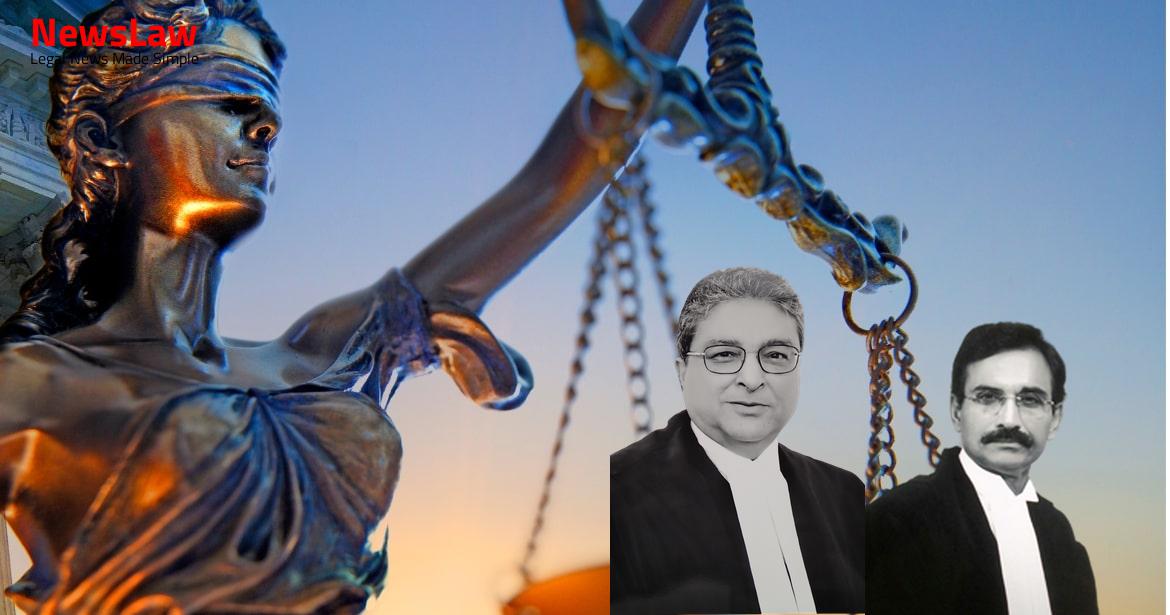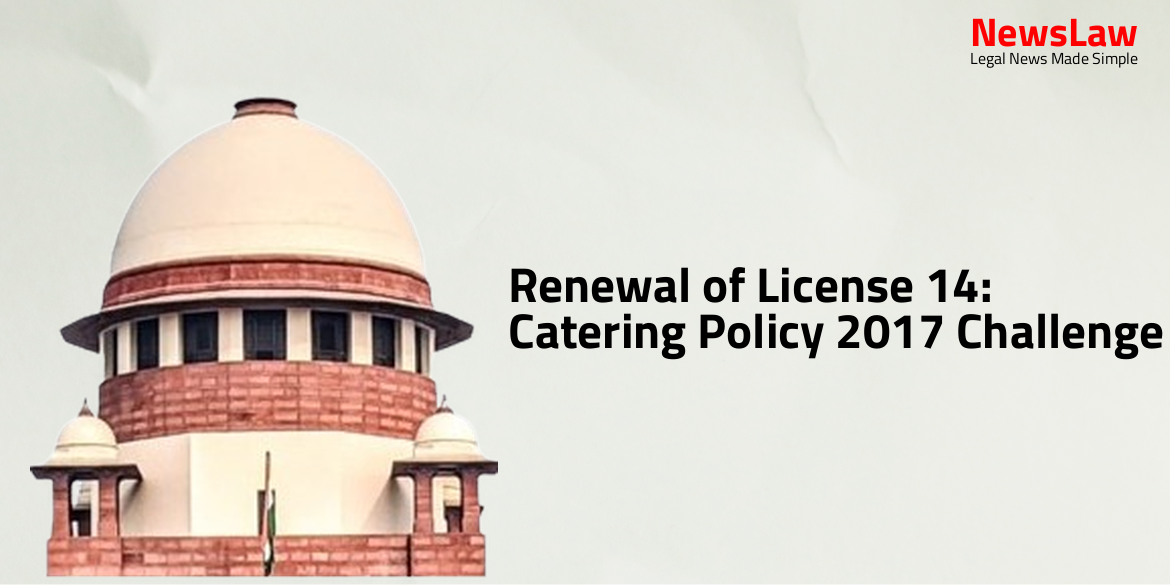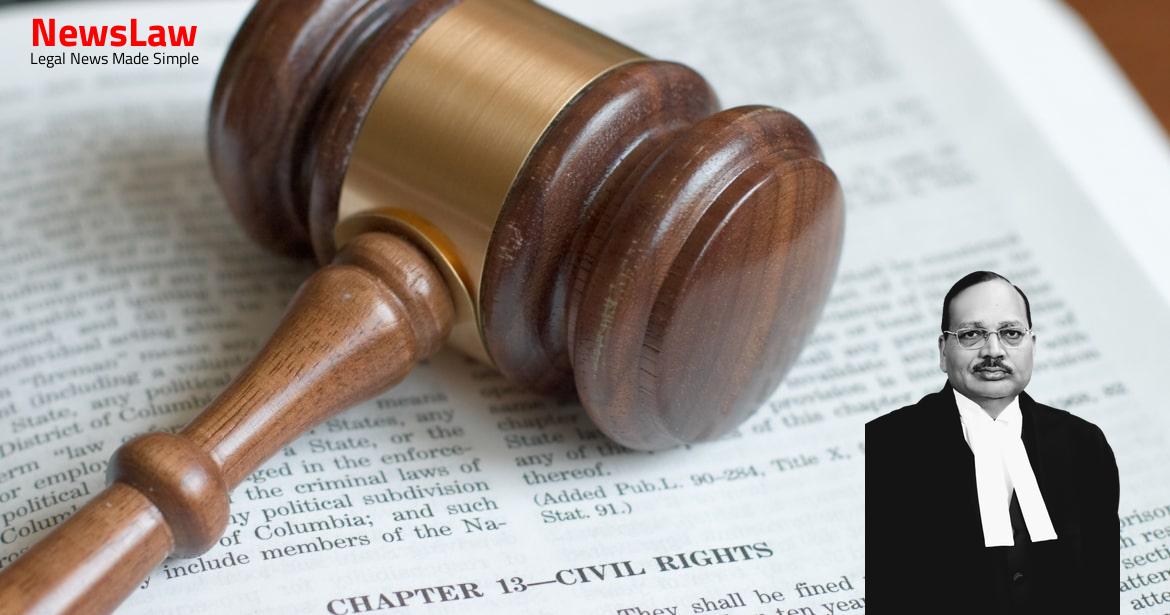In a significant legal case concerning a land mortgage dispute and loan security, the Supreme Court of India delivered a crucial judgment. The matter involved a dispute between two parties over the creation and validity of a mortgage agreement. The decision carries implications for similar cases and sheds light on the legal aspects surrounding loan security on property.
Facts
- The appellant advanced a loan of Rs.10,00,000/- to the respondent on the security of his properties.
- The respondent produced title document of his property as security towards debt under promissory notes and mortgages.
- The appellant filed a suit before the High Court for recovery of Rs.23,96,000/- along with interest at 36% p.a.
- The Single Judge decreed the suit after finding that the respondent had agreed to create equitable mortgage by depositing the title deeds.
- The appellant filed an application to set aside the First Impugned Order for restoration of the main appeal, which was dismissed by the Division Bench.
- The respondent did not execute a Sale Deed or pay the balance sum of Rs.2,00,000/- as agreed in the mortgage agreement.
- The Division Bench allowed the appeal stating the appellant failed to prove the existence of a mortgage executed by the respondent.
- The delay was condoned by the Division Bench on 18.04.2011 upon payment of a cost of Rs.1,000/- to the appellant.
- In his evidence as DW1, the respondent agreed to deposit the title deed to create an equitable mortgage for the loan.
Also Read: Bright Star vs State of India: Upholding Constitutional Rights in Employment Termination Case
Issue
- The issue at hand is whether property acquired through inheritance should be solely through a registered document.
- This brings up the question of whether registration is a mandatory requirement for property acquisition in such cases.
- Further consideration is needed to determine if all types of property, including inherited property, should require a registered document for acquisition.
Also Read: Cheque Bounce Case: Upholding Legal Presumptions
Arguments
- The appellant’s counsel argued that the plaint averments were sufficient to establish a valid mortgage entitling him to sue for a mortgage decree.
- It was contended that there was an agreement for loan transactions for which the mortgage was created by the respondent.
- The Single Judge correctly concluded that the respondent agreed to create a mortgage by depositing the title deed.
- The Agreement had to be considered along with promissory notes and documents related to the mortgage and loan repayment.
- The Division Bench’s decision of no prayer for a personal decree against the respondent was disputed.
- The appellant claimed he was not informed by his counsel or the Registry about the appeal status, leading to erroneous findings.
- The appellant contested that a printed statement on a vakalatnama cannot authorize counsel for all courts and proceedings.
- It was revealed to the appellant by his advocate that an ex-parte judgment was passed against him without notice.
- The Single Judge’s decree of the appellant’s suit and preliminary mortgage decree was supported.
- The Division Bench’s error in overlooking the stipulation to pay interest in the Agreement was highlighted.
- Various loans with stipulated interest were advanced by the appellant to the respondent, contradicting the Division Bench’s view.
- The vakalatnama given to the appellant’s counsel was argued to be solely for specific proceedings, not all courts and appeals.
- The overall reading of the plaint, Agreement, Proof Affidavits, and evidence supported the loan secured by the respondent through mortgaging the property.
- Once the parties agreed on a contractual interest rate, the Division Bench erred in denying the stipulation of interest in the Agreement.
- The Agreement does not mention the creation of any mortgage but only the sale of the property to the appellant
- The Division Bench upheld that a suit for foreclosure cannot be maintained based on the Agreement
- The plaint claims Rs.23,96,000/- due as per the Agreement without specifying how the amount was calculated
- The Second Impugned Order found no merit in the appellant’s case and denied any indulgence
- The findings in the First Impugned Order that no mortgage was created align with the Agreement’s contents
Also Read: The Case of A.S. Raghavendra vs. The M/S Bharti Airtel Limited: Workman Status Dispute
Analysis
- The Orders impugned need interference as the First Impugned Order has legal errors.
- The Single Judge rightly considered the factual prism and focused on the core issue without irrelevant facts.
- The Division Bench did not account for Section 58(f) of the Act regarding mortgages by deposit of title deeds.
- A mortgage is the transfer of interest in specific immovable property to secure payment. The mortgagor, mortgagee, mortgage money, and mortgage deed are defined terms.
- In cases like this, no civil or criminal law remedy was availed by the appellant.
- The Agreement does not create or extinguish rights/liabilities, only records what has happened.
- No instrument is required for a mortgage by deposit of title deeds as per Section 58(f) of the Act.
- The First Impugned Order needs to be set aside due to errors.
- A mortgage by deposit of title deeds does not require registration and only requires three requisites: debt, deposit of title deeds, and intent for security.
- A document recording a concluded transaction without creating rights/liabilities does not need registration.
- The appellant had moved the Division Bench for a fresh hearing of the main appeal, leading to the Second Impugned Order.
- The burden of proof for threat/coercion while signing an agreement lies on the party pleading it.
- The panchayat’s attempt at resolution led to the Agreement between the parties.
- No steps were taken by the appellant to revoke the Agreement for at least half a decade.
- Mere statements without evidentiary backing do not hold legal weight in a case.
- In the case of Esha Bhattacharjee v Managing Committee of Raghunathpur Nafar Academy, principles for condonation of delay were outlined.
- Syndicate Bank v Estate Officer & Manager, APIIC Ltd. highlighted that there is no presumption that mere deposit of title deeds constitutes a mortgage.
- The necessity of registering a document in a mortgage transaction was emphasized based on Section 17 of the Registration Act.
- K.J. Nathan v. S.V. Maruty Reddy clarified the importance of registered instruments in mortgages.
- Collectorr, Land Acquisition, Anantnag v Mst Katiji emphasized on a just and liberal approach in condoning delay to ensure justice on merits.
- N L Abhyankar v Union of India pointed out that the key consideration for condoning delay is the impact on the rights of third parties due to negligence.
- Municipal Council, Ahmednagar v Shah Hyder Beig reiterated the correct legal position in terms of delay.
- The essentials of an equitable mortgage were outlined as a debt, a deposit of title deeds, and the intention that the deeds serve as security.
- In Kalyan Kumar Gogoi v Ashutosh Agnihotri, the various colloquial uses of the term ‘evidence’ were discussed in the context of different senses.
- United Bank of India Ltd. v. Lekharam Sonaram & Co. reiterated the essence of a mortgage by deposit of title deeds involving the transfer of interest in specific immovable property for securing a loan.
- An usufructuary mortgage occurs when the mortgagor gives possession of the property to the mortgagee and allows them to retain possession until the mortgage money is repaid.
- An English mortgage involves the mortgagor transferring the property to the mortgagee with the condition of re-transfer upon full repayment of the mortgage money.
- A mortgage by conditional sale is when the mortgagor seemingly sells the property with conditions that upon default or payment, the sale becomes absolute or void.
- A mortgage by deposit of title-deeds happens when the mortgagor gives title documents to the creditor as security in specified towns.
- An anomalous mortgage is any mortgage that does not fit the definitions of simple mortgage, mortgage by conditional sale, usufructuary mortgage, English mortgage, or mortgage by deposit of title-deeds.
- A simple mortgage occurs when the mortgagor agrees to personally pay the mortgage money and allows the mortgagee to sell the property if the payment is not made.
- Quashing the First Impugned Order would nullify the effect of the Second Impugned Order.
- The Second Impugned Order cannot be faulted on its own merits.
- Despite the Second Impugned Order being justified, it would be nullified if the First Impugned Order is quashed.
Decision
- Costs of Rs.1,20,000 imposed on the appellant for legal misadventure and wastage of judicial time
- Cost to be deposited within 6 weeks with the High Court Registry for specific purposes
- Set aside both Impugned Orders
- Non-compliance will lead to the matter being placed before the court again
- Restoration of the Judgment dated 01.04.2010 with a modification in the interest rate
- Appeals allowed with the specified terms
- Liberal approach taken to condone the delay in I.A. No.16203/2019 subject to payment of costs
Case Title: A.B. GOVARDHAN Vs. P. RAGOTHAMAN (2024 INSC 640)
Case Number: C.A. No.-009975-009976 – 2024



